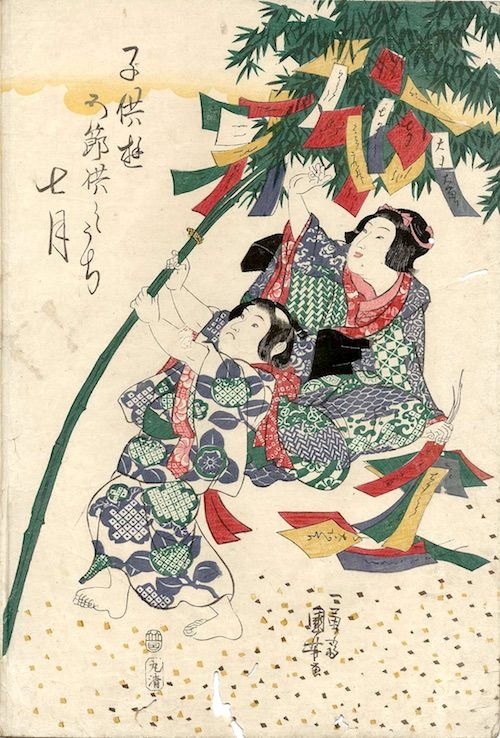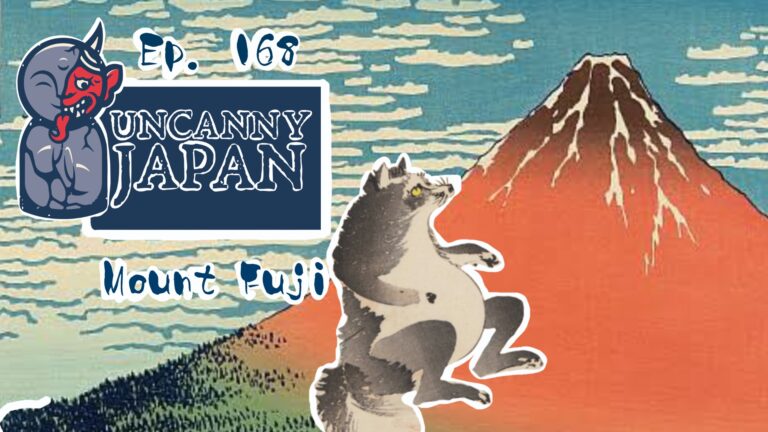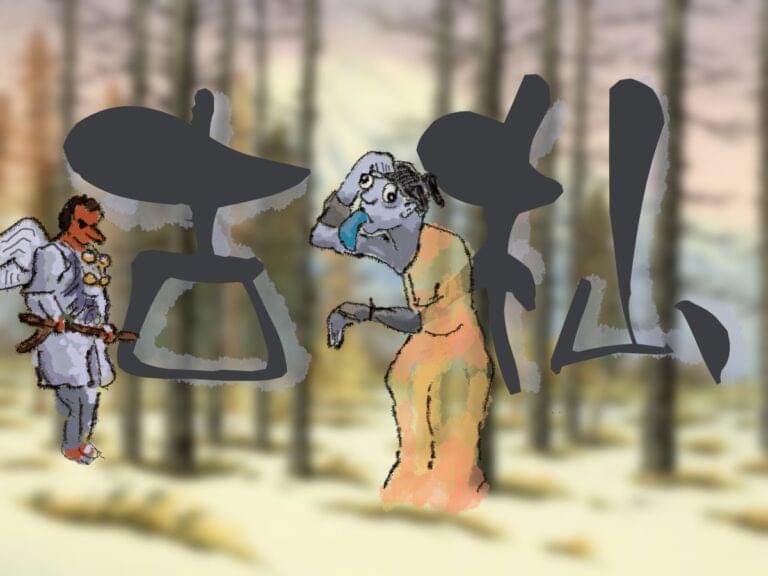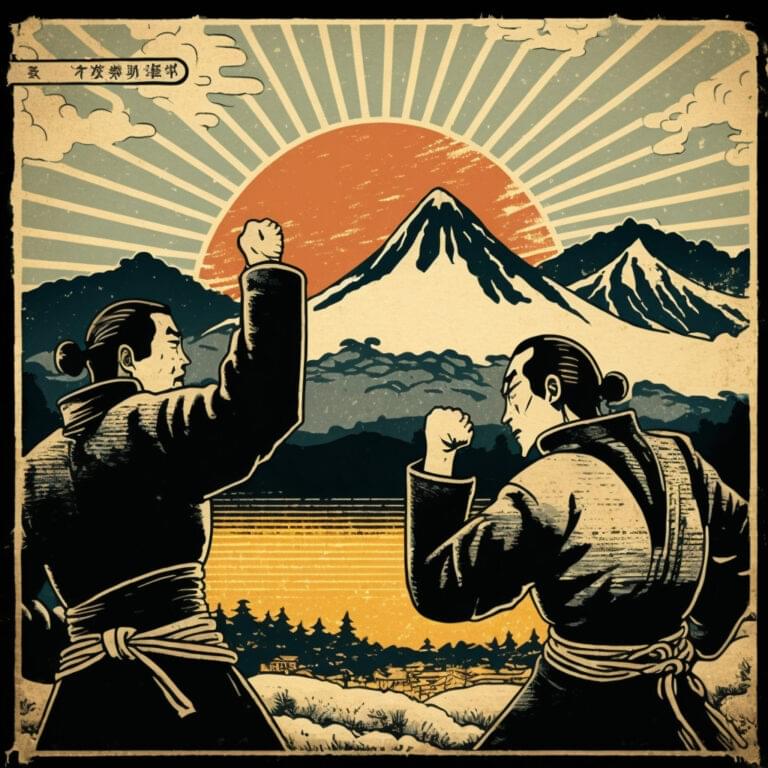Tanabata is a Japanese festival based on the bizarre tale of two star-crossed lovers, Orihime and Hikoboshi. In episode 55, I’ll tell you their story, explain a little about the origins and how it’s celebrated today.

Listen to the very end!
The Beginning of the Story
Imagine you’re a young princess and your name is Orihime. You’re stunning with long silky black hair, dressed in a fancy kimono with smoky bedroom eyes, all the things you imagine when you think of a princess. Not one of the golden-haired, blue-eyed, taffeta dressed ones. No. You’re either Chinese, Korean, or Japanese depending on which version of your story we’re telling.
(Record scratch) Oh, an important thing to add, when I say you’re young, you’re in your twenties. Just to make absolutely sure we remove any and all creep factor from this story. That’s important.
Okay, back to the tale. Your name is Orihime and that means Weaver Princess. So it’s no surprise to your or anyone that you just happen to be the best silk weaver in the entire galaxy. And I mean that literally because that’s where you do your weaving: on the banks of the Milky Way. It’s called Amanogawa in Japanese, which means heavenly river.
You’re up there among the stars, weaving the most magnificent cloth. So otherworldly, in fact, that all the other gods come to you to get their heavenly garments made. Your father, whose name is Tentei, by the way, and rather tyrannical if you want to know the truth, praises you constantly for your hard and beautiful work. You’re his only child and he loves you dearly. You love him ,too. So you keep working.
Days, weeks, months pass.
You’re in your twenties, remember, and you’re basically spending seven days a week at a loom and have been since this gift of yours was discovered. You start to feel sad and lonely, like something is missing from your life. You think maybe you’d like to meet someone your own age and hang out. But you can already guess how your dad is going to feel about that. But you can’t go on like this anymore.
Intro
Hey hey, everyone, how are you all doing? Hopefully healthy and hanging in there as best as you can. There isn’t a whole lotta news on my end.
Today we’re going to talk about Tanabata, or the Star Festival. So before we find out what fate befalls you, you weaver princess you, let’s look at a little backstory to the story, and a little about how Tanabata is celebrated today.
Tanabata Origins
Originally from China it came to Japan in 755, but didn’t really take off until much later during the Edo Era, the 1600s on out. It’s celebrated on the seventh day of the seventh month, which is July 7th for me and you. However, if you’re using an older lunar calendar, then depending on where you are in Japan and what traditions that area adheres to, it can be celebrated anywhere from July seventh to late in August.
The two main characters in the story this festival is based on are Orihime and Hikoboshi (who you’re going to learn about in a minute). And what’s cool about them is even though they are these mythological figures, they’re represented by the stars Vega and Altair, both very visible in the summer night sky around this time.
Tanabata Customs
So what does one do on Tanabata? Well, someone might bring home a large cutting from a bamboo tree. Kindergartens, elementary schools, and even supermarkets usually have one on display. I don’t believe individual households have their own bamboo or sasa branch so much, although my father-in-law loved bringing one home for us. And we loved decorating it.
That’s what comes next. People, again, this is really fun for children, write down their wishes on these rectangular-shaped pieces of paper. They’re called tanzaku (短冊). They then tie them to the tree, so that there are dozens if not more wishes flittering about. I want to pass my math test. I wish my kanji characters to improve. I hope to be a J-League soccer player one day. Anything is okay. But just know other curious eyes might glance at your wish. So nothing weird.
On top of the pretty tanzaku wishes dangling from the tendrilly branches, you can also decorate the tree with other colorful and shiny ornaments, usually homemade with origami paper. So the whole thing becomes this very gorgeous wish tree. Single household ones aren’t especially amazing, at least ours wasn’t, but the ones that have more people working on them are really cool. Hundreds of wishes, along with streamers, origami cranes, those paper chains you used to make when you were little, and all kinds of creative goodies fluttering in the breeze and adding life to the spindly bamboo tree.
When the night of tanabata arrives, just maybe your wish will be chosen and come true.
One of the things I used to really like about the festival was walking with my son to the shoutengai, a kind of Showa Era covered shopping street on the night of Tanabata. We would stroll down the bustling street under dozens upon dozens of enormous strung up crepe paper decorations. These were usually big fancy paper balls, called a kusudama, with long, brightly colored streamers flowing underneath them.
I just learned that this design was originated in Sendai in 1946 by a shop owner. The Sendai Tanabata festival is one of the more famous ones with thousands of decorations lining the streets. So if you’re ever there around this time, definitely check that out. Anyway, the streets would be bustling with people all dressed in yukata, wearing geta shoes, and the crepe paper ribbons would be so long you had to walk through them. On both sides of the street would be food stalls selling savory yakisoba noodles, squid legs grilled in soy sauce, chocolate dipped bananas or kakigouri (かき氷), big cups of strawberry shaved ice topped with condensed milk. It always felt like Tanabata got you excited about summer vacation, which in Japan lasts roughly the month of August.
So other than the story, the decorating the sasa branch, and walking through the covered strip mall, that’s pretty much the whole festival as we observed it.
You’ll often read that the story of Tanabata is so very romantic. I never thought so. It’s interesting and more than a little bizarre, but I’m not sure romantic is the word I’d chose to describe Orihime’s tale While there are different versions of the myth of the star-crossed lovers all up and down Japan, they don’t really differ in any significant way. The ending is more or less the same. The one I’m re-telling now is the one I’m most familiar with. Do read around if you’d like to hear different versions.
Tanabata Story Continued
Where were we? Yes, we left you weeping at your loom on the shore of the Amanogawa, the heavenly river, or Milky Way in English. You gaze out at the stars and think how it might be nice to meet someone your own age and even go on a date perhaps.
Your father, Tentei, catches you slacking and notices your downtrodden face. He asks what’s wrong. Even though you worry about his reaction, you’re quite distraught and figure what do you have to lose, so you go ahead and confide in him. To your surprise he understands and agrees to introduce you to someone nice, someone he’s picked out. Then your dad sets out, looks high and low, until he finds, on the other side of the Milky Way, a very handsome and good natured boy, who is strong and attractive and a hard worker. Everything you’d want in a blind date. His name is Hikoboshi and he is a cow herder, of the stars. He herds star cows.
Well, the moment you two meet each other the chemistry is electric. Love at first sight. You don’t even wait for your second date. You get married right away and life is amazing. Every day, gazing lovingly into each others eyes, sharing your most personal thoughts and dreams. You frolic and laugh and all those other newly wed things that newly weds do.
Actually, you and Hikoboshi have so much fun hanging out together you totally forget your celestial duties. Fine silk kimono aren’t being woven and the gods are lining up to complain to your dad. While on the other side of the Milky Way star cows aren’t being herded and are wandering around everywhere, lost, confused, hungry, and sometimes sick.
Tentei, your dad, is furious. He summons you both and says.
This is unacceptable! From now on you will live on either side of the Amanogawa. Orihime, stays on this side, and starts her weaving duties again in earnest. Hikoboshi, you return to the other side of the Milky Way and take care of those cows.
You’re devastated. Kneeling down at the loom once again, your husband and best buddy banished, you can’t even bring yourself to weave. Instead you collapse and cry and sob, wail and moan. This goes on for days, until your father can finally take it no more. He agrees to let you see your husband once a year, on the seventh day on the seventh month.
Your spirits lighten and you begin your seven day a week weaving routine. The gods come, parade around in the finery you’ve made, and leave happy and content. This continues until July 7th. The day you’ll get to be with your husband again. You stand on your side of the Amanogawa but notice there is no bridge.
What? Father is conveniently absent. You run back and forth but there is no way to get across this Heavenly River. Time is running out. You break down again and begin to cry. This time, though, a flock of magpies hear you and take pity. They fly over and create a bridge with their outspread wings, a kind of bird-bridge for you to cross. You do, and are reunited with your one true love. Hikoboshi!
Life continues like this for the rest of your days. Which you think is fine, except on years when on the seventh day of the seventh month it rains. Because if the weather is bad and the people on earth can’t look up and see the stars, it means the magpies, too, cannot gather to make a bridge for you. Sadly. You and your cow herding husband must wait another year before you can hook up again. Not really the end as Tanabata is still celebrated to this day.
All playfulness aside, I have always really enjoyed the Tanabata festival. Thinking back to when my son was little, it is probably one of the festivals with the sweetest memories for me. The vibrant decorations and that magical feeling of hope when you write your wishes on brightly colored tanzaku and tie them to the frilly cut piece of bamboo. If you haven’t seen the festival yet, I do hope you can come to Japan one day and experience it for yourself. Just make sure that you check whether the area you plan to visit uses the old calendar or the new one.
I want to give a great big special thank you to my Patrons for your support and friendship. One of my Tanabata wishes is for all of you to have health, happiness, and continued awesomeness.
The women at the post office told me the rules for mailing things will change July first and I’m hoping that means I’ll be able to start sending all the back goodies to my patrons who have waited so patiently, and return to sending out postcards and envelopes per usual. That could be a Tanabata wish as well, come to think of
Thank you all for listening and I’ll talk to you in two weeks.
Bye bye.
Credits
Intro and outro music by Julyan Ray Matsuura
Celestial Background by TwisteriumMusic
Link: https://soundcloud.com/twisterium/celestial-background-besplatnaya-fonovaya-muzyka
License: http://creativecommons.org/licenses/by/3.0/
The Waltz Of The Kindness by MusicLFiles
Link: https://filmmusic.io/song/6283-the-waltz-of-the-kindness
License: http://creativecommons.org/licenses/by/4.0/
Midsummer Sky by Kevin MacLeod
Link: https://incompetech.filmmusic.io/song/4049-midsummer-sky
License: http://creativecommons.org/licenses/by/4.0/






